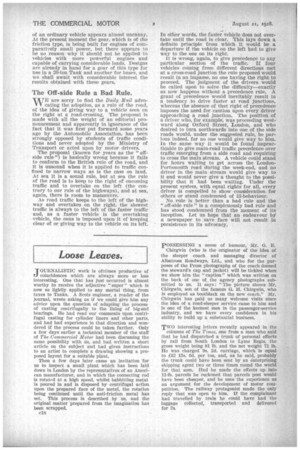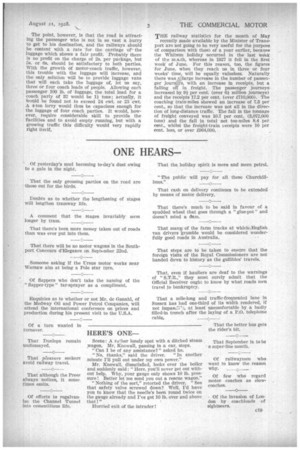Loose Leaves.
Page 2

Page 3

If you've noticed an error in this article please click here to report it so we can fix it.
JOURNALISTIC work is ofitimes productive of coincidences which are always more or less interesting. One that has just occurred is almost worthy to receive the adjective "super" which is now so lightly applied to any mortal thing, from taxes to Tanks. A Scots engineer, a reader of the journal, wrote asking us if we could give him any advice upon the question of adapting the process of casting centrifugally to the lining of big-end bearings. He had read our comments upon centrifugal casting for cylinder liners and other parts, and had had experience in that direction and wondered if the process could be taken farther. Only a few days earlier a technical member of the staff of The Commercial Motor had been discussing the same possibility with us, and had written a short article on the subject and had given instructions to an artist to complete'a drawing showing a proposed layout for a suitable plant.
Then a few days later came an invitation for us to inspect a small plant which has been laid down in London by the representatives of an American manufacturer, and in which the connecting rod is rotated at a high speed, whilst babhitting metal is poured in and is disposed by centrifugal action -upon the prepared face of the metal, the rotation being continued until the anti-friction metal has set. This process is described by us, and the original matter prepared from the imagination has been scrapped. POSSESSING a sense of humour, Mr. G. E.
Chirgwin (who is the originator of the idea of the sleeper coach and managing director of Albatross Roadways, Ltd., and who for the purposes of the Press photographs of the coach donned the steward's cap and jacket) will be tickled when we show him the "caption" which was writtes on the back of one of the agency photographs sub, mitted to us. It says: "The picture shows Mr. Chirgwin, son of the famous G. H. Chirgwin, who is employed as bootblack on the new coach." Mr. Chirgwin has paid us many welcome visits since the idea of, a road-sleeper service came to him and is one of the keenest men in the passenger-service industry, and we have every confidence in his ability to build up a substantial business.
TWO interesting letters recently appeared in the
columns of The Times, one from a man who said that he had dispatched a trunk of personal effects by rail from South London to Lyme Regis, the gross weight being 81 lb. and the net weight 71.1b. He was charged 9s. 2d. carriage, which is equal to fl2 13s.• Bd. per ton, and, as he said, probably the trunk could have been sent by an enterprising shipping agent two or three times round the world for that sum. Had he made the effects up into 11-lb. parcels he reckoned that parcels post would have been cheaper, and he uses the experience as an argument for the development of motor competition. The railway protagonist made the only reply that was open to him. If the complainant had travelled by train he could have had the luggage collected, transported and delivered for 2s, August 212 1928.
• The point, however, is that the road is attracting the passenger who is not in so vast a hurry to get to his destination, and the railways should be content with a rate for the carriage of the luggage which shows a fair profit. Probably there is no profit on the charge of 28. per package, but 5s. or 6s. should be satisfactory to both parties. With the growth of motor-coach traffic, however, this trouble with the luggage will increase, am0 the only solution will be to provide luggage vans that will each take the luggage of, let us say, three or four coach loads of people: Allowing each passenger 100 lb. of luggage, the total load for a coach party of 32 would be 1i tons; actually, it ivould be found not to exceed 24 cwt. or 25 cwt. A 4-ton lorry would thus be capacious enough for the luggage of four coach .parties. It would, however, require considerable skill to provide the facilities and to avoid empty running, but with a growing traffic this difficulty would very rapidly right itself, THE railway statistics for the month of May recently made available by the Minister of Transport are not going to be very useful for the purpose of comparison with those of a year earlier, because the Whitsun holiday occurred in the last week of the in)ntli, whereas in 1927 it fell in the first week of June. For this reason, too, the figures for June, when they reach us in three or four weeks' time, will be equally valueless. Naturally there was large increase in the number of passenger jourilLys, With an increase in receipts, but a falling off in freight. The passenger journeys increased by 9Aper cent. (over 6 million journeys) and the receipts 17.2 per cent. (over 1710,000). The coaching train-miles showed an increase of 7.3 per cent., so that the increase was not all in the direction of long-distance traffic. The fall in the tonnage of freight conveyed was 10.7 per cent. (3,072,000 tons) and the fall in total net ton-miles 8.4 per cent., whilst the freight-train lecelpts were 10 per cent, less, or over £964,000.


































